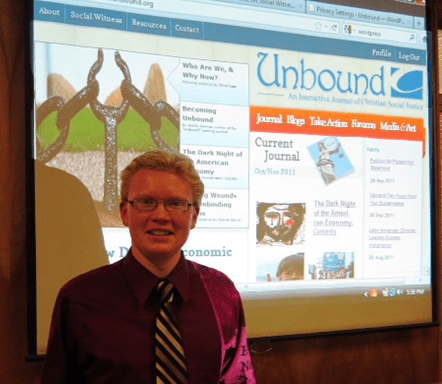[wpcol_1half id=”” class=”” style=””]
Taxation
Though essential in any discussion of fairness and equality or equity in the distribution of the fruits of economic productivity, taxation is a particularly ideological zone in US political culture. The Church’s latest in-depth discussion, Federal Tax Reform (1977) covers very basic matters of church concern and elaborates four criteria within a general push for progressivity. Along with its study are only brief recommendations: “(1) that the Federal Tax System and proposals for its reform are proper matters of concern for the Christian Church, and (2) that the criteria for considering tax law and tax reforms are these: equity, moral integrity, simplicity, and efficiency.”[16] Consideration of taxation also involves consideration of charitable deductions, now complicated by “charitable choice,” Faith Based Initiatives, and church/state boundary issues.[17]
Marginalized and impoverished groups (including immigrants)
The Church’s support for affirmative action and equal employment opportunity is frequently noted, but actual mechanisms such as selective purchasing requirements have atrophied since the 1970’s. Gender and age provisions for equal treatment are part of affirmations of pay equity and comparable worth legislation, and the addition of sexual orientation may also be added in situations not involving marriage protections. Advocacy for adequate welfare provisions, tax credits, and targeted programs are all regularly endorsed by the Church’s Washington Office. The Social Creed’s language here echoes that of 1908: “Abatement of hunger and poverty and enactment of policies benefiting the most vulnerable.” The Hunger Program, working with various resolutions relating to farming and community food adequacy, presents an alternative vision for sustainable agriculture and remedies for those with food insecurity in the US, as well as some development work overseas. The Fair Food program includes advocacy and support for worker organizing in agriculture. Support for the Immokalee workers in Florida, mainly of immigrant background, involved the boycott of Taco Bell, one of the more recent boycotts endorsed by the General Assembly.
The poor are most directly affected by declines in social services and public amenities, in addition to cuts in public education, public health, public transportation, libraries, and so forth. The debate over “entitlements” has been particularly misleading, but the bigger picture is of a nation in denial as to the real scope of poverty and decline in middle class status. The loss of housing through foreclosure and the rise of homelessness provide key visible indicators of the presence of poverty in our communities.
[/wpcol_1half] [wpcol_1half_end id=”” class=”” style=””]
The Assembly has recently spoken on Homelessness (2008), recommending supportive services and ways to develop affordable housing, should communities and their governments be interested in providing it. This treatment does not repeat our support for Social Security, Medicare and Medicaid, all recently reaffirmed in Economic Security for Older Adults (2006) and reinforced by calls for a “single payer” health policy (2008).
The globalization policy speaks in part to the linkage between trade agreements and human migrations, such as the wave of displaced Mexican farmers coming to the US, unable to grow corn cheaply enough to compete with subsidized US exports. War, resource wars, and climate refugees are also part of the globalization situation likely to get worse…
Military Spending / Security Expenditures
“Peacemaking: The Believers’ Calling” (1980), the foundational position for the church’s ministries in this area, called for participation in efforts devoted “to slowing, stopping, and reversing the worldwide arms race.” Military-related investment guidelines adopted two years later (1982) restricted the church’s investments in the largest military contractors, those most dependent on military production, and the makers of key nuclear warhead components—consonant with the church’s 1988 position in favor of nuclear disarmament. The General Assembly has not, however, addressed the economics of militarism in a significant way, either within the arms race framework or the framework of a “unipolar” empire seeking “full spectrum” dominance. Walter Owensby has called for more treatment of “economic shalom.” The Social Creed calls directly for “nuclear disarmament and redirection of military spending to more peaceful and productive uses.” Infrastructure, or green technology, might be examples of such uses.
Building a Sustainable Economy
Since the 1976 study, it may be concluded that it is hard to have a new economic ethic without more initiatives toward an actual new economy. The rise in environmental disasters due to climate change is becoming increasingly undeniable, but the U.S. failure to complete its endorsement of the Kyoto protocol (repeatedly called for by the General Assembly) and other failures in climate-related legislation point back to political attachment to traditional energy subsidies and patterns as well as determined, well-funded efforts to weaken all regulation. The arguments about international competitiveness may work in this area, as energy independence (liberty) gardening hasn’t been that effective yet.
[/wpcol_1half_end]






Unbound Social